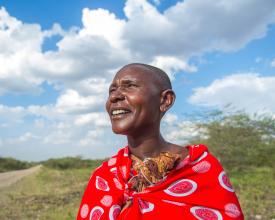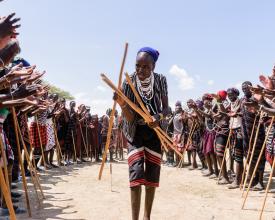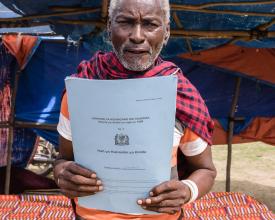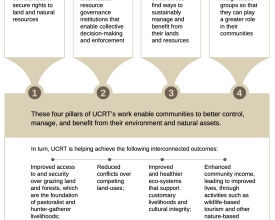Community connected land tenure for better livelihoods and conservation in northern Tanzania.
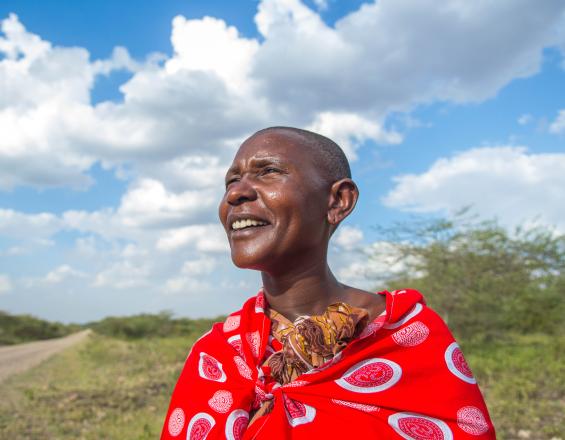
Pastoralist, agro-pastoralist and hunter-gatherer communities have traditionally occupied the semiarid and arid areas of northern Tanzania, where they have managed the land sustainably, supporting both themselves and the wildlife that live there. Threats of land alienation and increasing resource degradation add to the insecurity of these natural resource dependent livelihood systems. In 2011, UCRT pioneered the communal certificate of Customary Right of Occupancy. Community land tenure provides local communities with the rights to own the communal land and resources which they live and depend on. Through supporting land rights and nature based livelihoods, and empowering these communities to sustainably manage the community land, huge areas of wildlife areas can be protected which otherwise would be susceptible to agriculture, encroachment and deforestation.
Context
Challenges addressed
Greater land tenure security helps address a number of challenges faced by indigenous communities in northern Tanzania. The largely rangeland areas that support pastoralist, agro-pastoralists and hunter-gatherers are all being affected by rapid environmental change. Threats of land alienation and increasing resource degradation add to the insecurity of these natural resource dependent livelihood systems. These communities commonly experience food insecurity for several months of every year as agricultural and settlement expansion has fragmented and compressed available grazing land and forest. From this conflict can arise between communities as pressure is placed on access to pasture, water and other natural resources. Furthermore, as communities experience economic insecurity more pressure is placed on girls to get married at a younger age and access to education is reduced.
Location
Process
Summary of the process
UCRT believes that empowering pastoralist, agro-pastoralist, and hunter-gatherer communities communities is a fundamental step towards a just and sustainable society. It achieves this by:
- Supporting communities to secure rights to land and natural resources
- Strengthening local natural resource governance institutions that enable collective decision-making and enforcement
- Helping communities find ways to sustainably manage and benefit from their lands and resources
- Empowering marginalised groups so that they can play a greater role in their communities
UCRT’s work enable communities to better control, manage, and benefit from their environment and natural assets.
In turn, UCRT is helping achieve the following interconnected outcomes:
Improved access to and security over grazing land and forests, which are the foundation of pastoralist and hunter-gatherer livelihoods;
Reduced conflicts over competing land-uses;
Improved
and healthier eco-systems that support customary livelihoods and cultural integrity;
Enhanced community income, leading to improved lives, through activities such as wildlife-based tourism and other nature-based enterprises.
Building Blocks
1.COMMUNITY LAND TENURE -
About 70% of Tanzanian land falls under village land owned and managed by local communities. Due to this, the Tanzanian Land Act allows for ownership and management of land by communities through local governing bodies. To secure Land Rights for these communities therefore means that a village must have a Village Land Certificate which defines the official boundaries of each village and to get that, conflict resolution must be carried out for neighbouring villages to amicably agree on the boundaries of their respective villages. After that, Communities are supported to undertake a village Land Use Plan guided by the National Land Use Planning guidelines. Having done that, communities are then supported to secure through a communal certificate of Customary Right of Occupancy (CCRO) a communal title to their land in which they continue to practice their traditional practices that are friendly and help conserve the environment. These communal CCROs are connected to each other to support mobility of livestock and wildlife from one area to another which helps these animals access crucial shared resources such as water points and salt licks
Enabling factors
In order to enable the success of these building blocks participation is essential. We believe that empowerment is crucial for equitable engagement and representation for effective resource management. Conflict resolution is also a key piece of the process We meditate conflicts in order to gain stronger participation and for collective action in the sustainable management of community connected land.
Lesson learned
SUSTAINABLE MANAGEMENT—Significant effort has been invested in supporting communities to secure formal rights over land, but tenure security alone does not mean that those lands are productive and healthy, particularly given the growing pressures created by human population growth, livestock impacts, land-use pressures, and climate change. Does work need to be done to improve the condition and sustainably manage rangelands and natural resources once they have been secured? And if so, what should UCRT’s role be in this? Building on the development of land-use plans and bylaws, UCRT expanded its approach by:
• Ensuring communities protect connectivity between migratory livestock routes;
• Integrating scientific knowledge with customary management approaches to improve pasture; and
• Mainstreaming information related to climate change impacts and population growth.
2.GOVERNANCE
Enabling factors
In order to enable the success of these building blocks participation is essential. We believe that empowerment is crucial for equitable engagement and representation for effective resource management. Conflict resolution is also a key piece of the process We meditate conflicts in order to gain stronger participation and for collective action in the sustainable management of community connected land.
Lesson learned
NATURAL RESOURCE BENEFITS—the ultimate aim of UCRT’s efforts is to enable communities to benefit from their sustainably managed land and natural resources in order to improve their livelihoods. There are several key steps to this—building local capacity, strengthening governance institutions, securing rights and tenure, improving management, and finally generating benefits. We identified that UCRT needs to engage in all aspects of this process, or, through their foundational work on capacity building, governance, and securing rights are they delivering enough critical impact that only they can provide.
WOMEN’S ECONOMIC EMPOWERMENT— Capable women are often prevented from holding leadership positions due to their poverty. The entry point for these activities will be women in the Women Right’s and Leadership Forums that UCRT already works to strengthen. UCRT will build its internal capacity in order to directly assist women to develop nature-based livelihoods. UCRT will also work closely with partners who already have skills in naturebased enterprise development to bring additional knowledge, skills and opportunities to the WRLFs.
3.COMMUNITY NATURAL RESOURCE MANAGEMENT
UCRT works to dually support the rights and wellbeing of communities and the flora and fauna of northern Tanzania by helping communities adaptively improve and strengthen their management systems and practices. This is done by facilitating village formulation of land use plans and natural resource management by-laws and building community capacity to sustainably manage the rangelands across village borders.
Enabling factors
In order to enable the success of these building blocks participation is essential. We believe that empowerment is crucial for equitable engagement and representation for effective resource management. Conflict resolution is also a key piece of the process We meditate conflicts in order to gain stronger participation and for collective action in the sustainable management of community connected land.
Lesson learned
- SUSTAINABLE MANAGEMENT— Building on the development of land-use plans and bylaws, UCRT expanded its approach by:
• Ensuring communities protect connectivity between migratory livestock routes;
• Integrating scientific knowledge with customary management approaches to improve pasture; and
• Mainstreaming information related to climate change impacts and population growth.
UCRT now works with elected Grazing Committees comprised of Traditional Leaders and build their knowledge and skills on rangeland management at the village level, by communicating relevant scientific knowledge in ways that can be understood in a traditional context. UCRT helps them engage with other Grazing Committee representatives from connected villages to develop cross border grazing and land use agreements. These cross-border MOUs between villages with communal grazing CCROs supports livestock and wildlife mobility and ensure resources are shared fairly and sustainably beyond village borders.
4. NATURE-BASED LIVELIHOODS
Under this UCRT builds strategic partnerships with ethical investors and organisations skilled in nature based enterprise development. Community benefits are then increased through building capacity to engage in natural resource based enterprises, such as eco-tourism, carbon projects, or easements. UCRT also supports the economic empowerment of women so that they are in a position within their households and communities to be stewards of their land and natural resources.
Enabling factors
In order to enable the success of these building blocks participation is essential. We believe that empowerment is crucial for equitable engagement and representation for effective resource management. Conflict resolution is also a key piece of the process We meditate conflicts in order to gain stronger participation and for collective action in the sustainable management of community connected land.
Lesson learned
NATURAL RESOURCE BENEFITS—the ultimate aim of UCRT’s efforts is to enable communities to benefit from their sustainably managed land and natural resources in order to improve their livelihoods. There are several key steps to this—building local capacity, strengthening governance institutions, securing rights and tenure, improving management, and finally generating benefits. We identified that UCRT needs to engage in all aspects of this process, or, through their foundational work on capacity building, governance, and securing rights are they delivering enough critical impact that only they can provide.
WOMEN’S ECONOMIC EMPOWERMENT— Capable women are often prevented from holding leadership positions due to their poverty. The entry point for these activities will be women in the Women Right’s and Leadership Forums that UCRT already works to strengthen. UCRT will build its internal capacity in order to directly assist women to develop nature-based livelihoods. UCRT will also work closely with partners who already have skills in naturebased enterprise development to bring additional knowledge, skills and opportunities to the WRLFs.
Impacts
UCRT has used this innovative communal tenure mechanism to help communities secure over 1,100,000 hectares of indigenous community connected land. These rangeland areas are located near some of Tanzania’s most protected wildlife areas. Important ecosystems have been protected, securing wildlife migration paths and breeding areas, allowing for connectivity to national parks and other protected areas. Communities benefit from greater economic security from the sustainable management of their land and natural resources. For example, in 2020 communities in Makame Wildlife Management Area received $361,000 from carbon offsetting and the Hadzabe tribe have better food security since the introduction of ecotourism initiatives. Greater land tenure security empowers communities. Women can now benefit from land ownership. When women own land food security increases, family health improves and children have increased access to education.
Beneficiaries
The Ujamaa Community Resource Team (UCRT) uses CCRO’s to improve the lives of pastoralist, agro-pastoralist, and hunter-gatherer communities in northern Tanzania. These communities include the Maasai, Barabaig, Akie, Sonjo and Hadzabe tribes.
Sustainable Development Goals
Story
Olterere Leartunde - Village Chair of Emboreet
The current government started working with UCRT in 2018. UCRT did a valuable job with the central government to demarcate and get certificates for communal lands, rangelands and grazelands. UCRT also supported the surveying and certification of public areas and land belonging to women and people with disabilities, leading to a reduction in conflict over ownership of land. My job is significantly easier now, as in the past, as Village Chair, I had to deal with a lot of issues about conflict over land. UCRT’s project has helped solve a lot of these conflicts. Orkesumet used to see a lot of cases about land conflict. Now, only minor cases make it to the district, which is a reflection of the community being more at peace.
People have learned the value of land through the process of surveying and demarcation of their land. With the support of the central government, UCRT helped 25 women and people with disabilities survey their land and secure certificates of ownership. This process was funded by UCRT, which is significant, as these people would not have been able to afford it otherwise.
If the progress they have seen to date continues, and other activities are implemented (a different range of training) the community will be safer, there will be more development, as there will be less conflict and people will once again live in harmony with wildlife.
Emboreet has benefited significantly from this project due to the reduction in conflicts over land. I have benefited from the project by being able to help women and disabled people, which I would not have been able to do alone. I believe that helping individuals has a significant impact. We are all benefitting from healthier rangelands and livestock and wildlife in the area are thriving.
